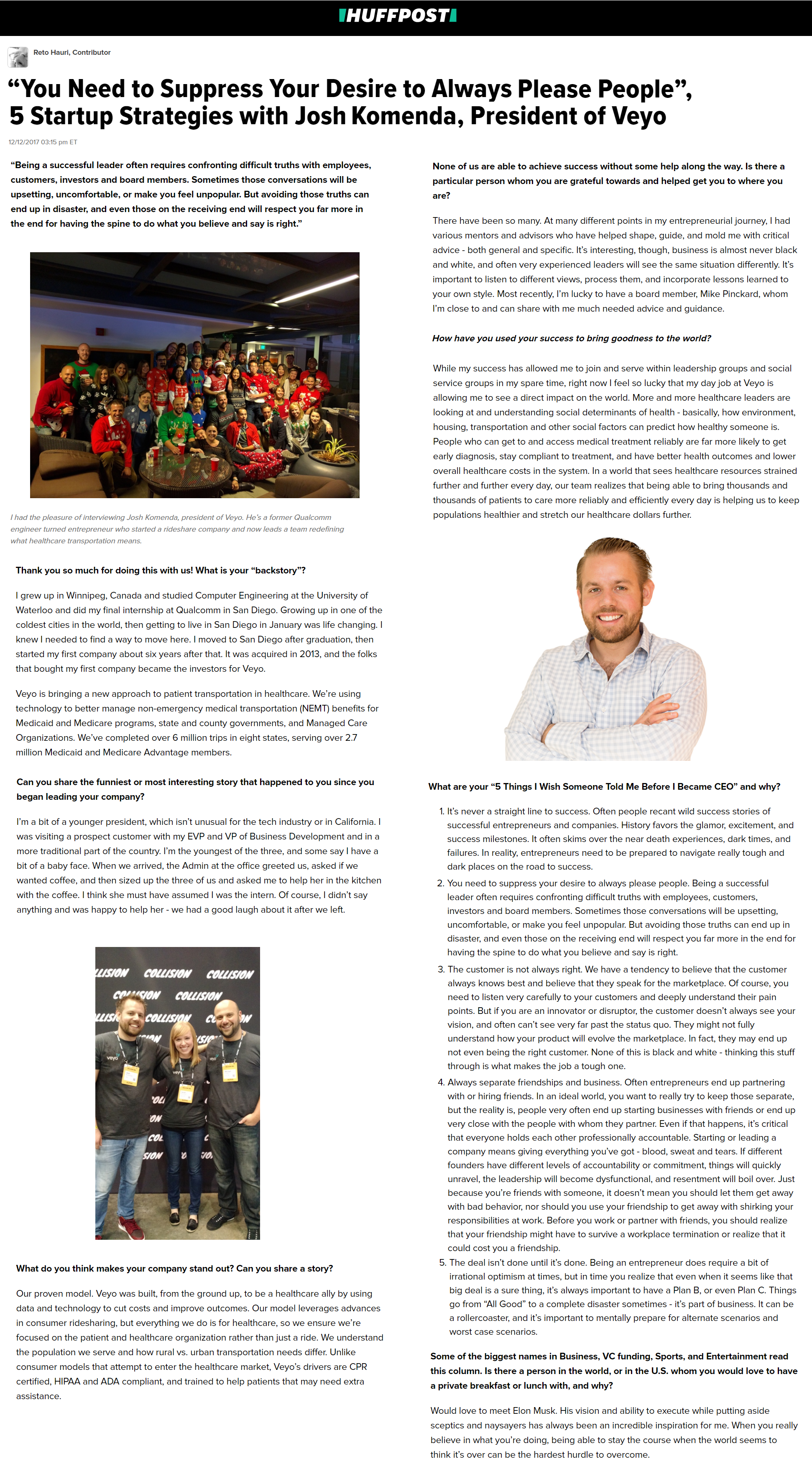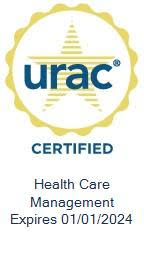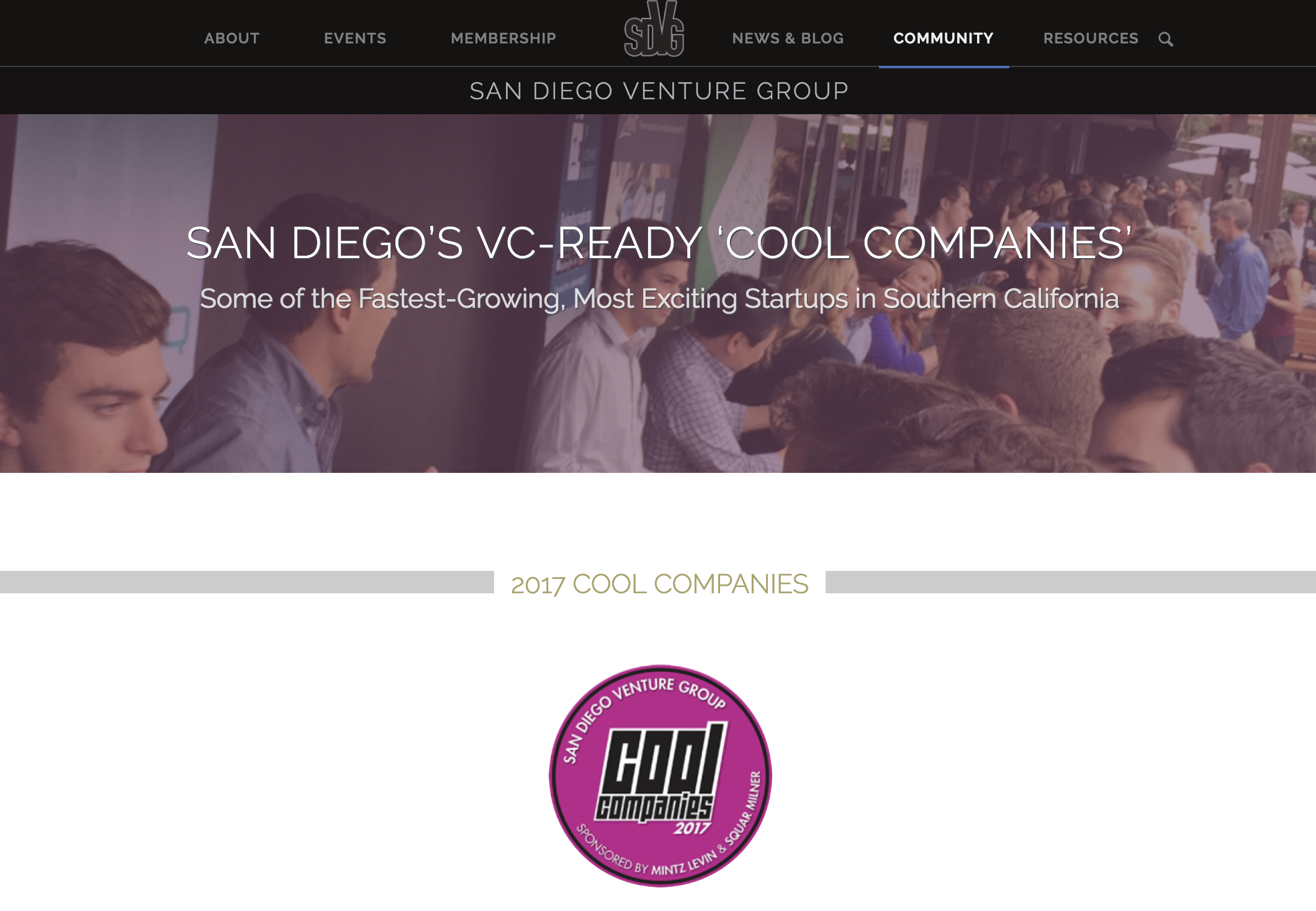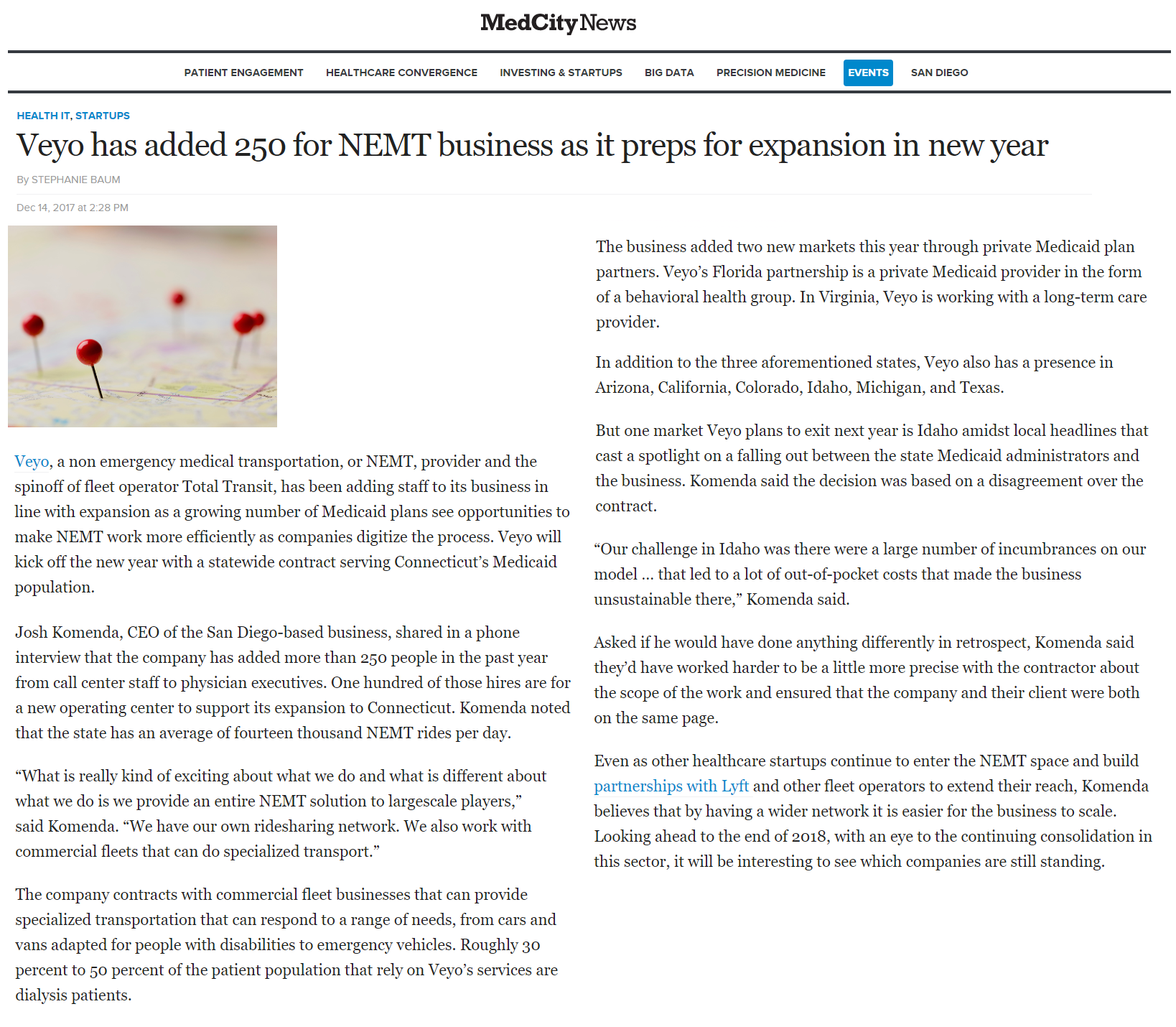Huffington Post’s 5 Startup Strategies with Josh Komenda, President of Veyo
December 14, 2017
Josh Komenda, President of Veyo, was recently interviewed by Reto Hauri for the Huffington Post’s “5 Things I Wish Someone Told Me Before I Became CEO” series. The original article can be found here.
——-
I had the pleasure of interviewing Josh Komenda, president of Veyo. He’s a former Qualcomm engineer turned entrepreneur who started a rideshare company and now leads a team redefining what healthcare transportation means.
Thank you so much for doing this with us! What is your “backstory”?
I grew up in Winnipeg, Canada and studied Computer Engineering at the University of Waterloo and did my final internship at Qualcomm in San Diego. Growing up in one of the coldest cities in the world, then getting to live in San Diego in January was life changing. I knew I needed to find a way to move here. I moved to San Diego after graduation, then started my first company about six years after that. It was acquired in 2013, and the folks that bought my first company became the investors for Veyo.
Veyo is bringing a new approach to patient transportation in healthcare. We’re using technology to better manage non-emergency medical transportation (NEMT) benefits for Medicaid and Medicare programs, state and county governments, and Managed Care Organizations. We’ve completed over 6 million trips in eight states, serving over 2.7 million Medicaid and Medicare Advantage members.
Can you share the funniest or most interesting story that happened to you since you began leading your company?
I’m a bit of a younger president, which isn’t unusual for the tech industry or in California. I was visiting a prospect customer with my EVP and VP of Business Development and in a more traditional part of the country. I’m the youngest of the three, and some say I have a bit of a baby face. When we arrived, the Admin at the office greeted us, asked if we wanted coffee, and then sized up the three of us and asked me to help her in the kitchen with the coffee. I think she must have assumed I was the intern. Of course, I didn’t say anything and was happy to help her – we had a good laugh about it after we left.
What do you think makes your company stand out? Can you share a story?
Our proven model. Veyo was built, from the ground up, to be a healthcare ally by using data and technology to cut costs and improve outcomes. Our model leverages advances in consumer ridesharing, but everything we do is for healthcare, so we ensure we’re focused on the patient and healthcare organization rather than just a ride. We understand the population we serve and how rural vs. urban transportation needs differ. Unlike consumer models that attempt to enter the healthcare market, Veyo’s drivers are CPR certified, HIPAA and ADA compliant, and trained to help patients that may need extra assistance.
None of us are able to achieve success without some help along the way. Is there a particular person whom you are grateful towards and helped get you to where you are?
There have been so many. At many different points in my entrepreneurial journey, I had various mentors and advisors who have helped shape, guide, and mold me with critical advice – both general and specific. It’s interesting, though, business is almost never black and white, and often very experienced leaders will see the same situation differently. It’s important to listen to different views, process them, and incorporate lessons learned to your own style. Most recently, I’m lucky to have a board member, Mike Pinckard, whom I’m close to and can share with me much needed advice and guidance.
How have you used your success to bring goodness to the world?
While my success has allowed me to join and serve within leadership groups and social service groups in my spare time, right now I feel so lucky that my day job at Veyo is allowing me to see a direct impact on the world. More and more healthcare leaders are looking at and understanding social determinants of health – basically, how environment, housing, transportation and other social factors can predict how healthy someone is. People who can get to and access medical treatment reliably are far more likely to get early diagnosis, stay compliant to treatment, and have better health outcomes and lower overall healthcare costs in the system. In a world that sees healthcare resources strained further and further every day, our team realizes that being able to bring thousands and thousands of patients to care more reliably and efficiently every day is helping us to keep populations healthier and stretch our healthcare dollars further.
What are your “5 Things I Wish Someone Told Me Before I Became CEO” and why?
- It’s never a straight line to success. Often people recant wild success stories of successful entrepreneurs and companies. History favors the glamor, excitement, and success milestones. It often skims over the near death experiences, dark times, and failures. In reality, entrepreneurs need to be prepared to navigate really tough and dark places on the road to success.
- You need to suppress your desire to always please people. Being a successful leader often requires confronting difficult truths with employees, customers, investors and board members. Sometimes those conversations will be upsetting, uncomfortable, or make you feel unpopular. But avoiding those truths can end up in disaster, and even those on the receiving end will respect you far more in the end for having the spine to do what you believe and say is right.
- The customer is not always right. We have a tendency to believe that the customer always knows best and believe that they speak for the marketplace. Of course, you need to listen very carefully to your customers and deeply understand their pain points. But if you are an innovator or disruptor, the customer doesn’t always see your vision, and often can’t see very far past the status quo. They might not fully understand how your product will evolve the marketplace. In fact, they may end up not even being the right customer. None of this is black and white – thinking this stuff through is what makes the job a tough one.
- Always separate friendships and business. Often entrepreneurs end up partnering with or hiring friends. In an ideal world, you want to really try to keep those separate, but the reality is, people very often end up starting businesses with friends or end up very close with the people with whom they partner. Even if that happens, it’s critical that everyone holds each other professionally accountable. Starting or leading a company means giving everything you’ve got – blood, sweat and tears. If different founders have different levels of accountability or commitment, things will quickly unravel, the leadership will become dysfunctional, and resentment will boil over. Just because you’re friends with someone, it doesn’t mean you should let them get away with bad behavior, nor should you use your friendship to get away with shirking your responsibilities at work. Before you work or partner with friends, you should realize that your friendship might have to survive a workplace termination or realize that it could cost you a friendship.
- The deal isn’t done until it’s done. Being an entrepreneur does require a bit of irrational optimism at times, but in time you realize that even when it seems like that big deal is a sure thing, it’s always important to have a Plan B, or even Plan C. Things go from “All Good” to a complete disaster sometimes – it’s part of business. It can be a rollercoaster, and it’s important to mentally prepare for alternate scenarios and worst case scenarios.
Some of the biggest names in Business, VC funding, Sports, and Entertainment read this column. Is there a person in the world, or in the U.S. whom you would love to have a private breakfast or lunch with, and why?
I would love to meet Elon Musk. His vision and ability to execute while putting aside skeptics and naysayers has always been an incredible inspiration for me. When you really believe in what you’re doing, being able to stay the course when the world seems to think it’s over can be the hardest hurdle to overcome.




